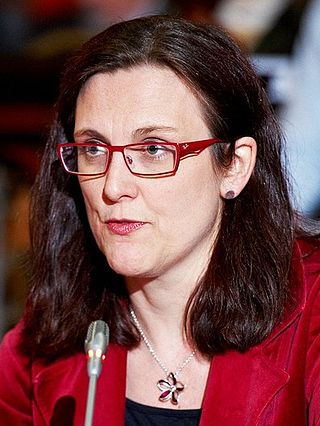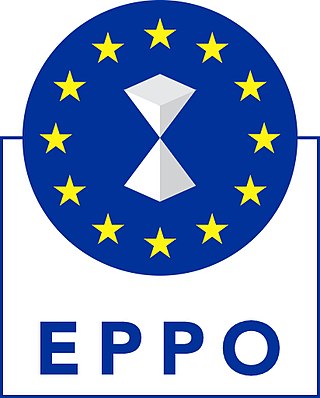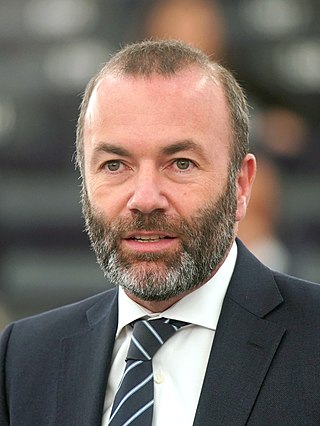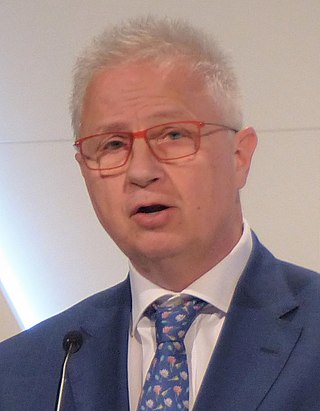
The European Commission (EC) is part of the executive of the European Union (EU), together with the European Council. It operates as a cabinet government, with 27 members of the Commission headed by a President. It includes an administrative body of about 32,000 European civil servants. The Commission is divided into departments known as Directorates-General (DGs) that can be likened to departments or ministries each headed by a Director-General who is responsible to a Commissioner.

A European Commissioner is a member of the 27-member European Commission. Each member within the Commission holds a specific portfolio. The commission is led by the President of the European Commission. In simple terms they are the equivalent of government ministers.

Viviane Adélaïde Reding is a Luxembourgish politician and a former Member of the European Parliament (MEP) from Luxembourg. She is a member of the Christian Social People's Party, part of the European People's Party. She previously served as European Commissioner for Education and Culture from 1999 to 2004, European Commissioner for Information Society and Media from 2004 to 2010 and European Commissioner for Justice, Fundamental Rights and Citizenship from 2010 to 2014.

The institutions of the European Union are the seven principal decision-making bodies of the European Union and the Euratom. They are, as listed in Article 13 of the Treaty on European Union:

The political structure of the European Union (EU) is similar to a confederation, where many policy areas are federalised into common institutions capable of making law; the competences to control foreign policy, defence policy, or the majority of direct taxation policies are mostly reserved for the twenty-seven state governments. These areas are primarily under the control of the EU's member states although a certain amount of structured co-operation and coordination takes place in these areas. For the EU to take substantial actions in these areas, all Member States must give their consent. Union laws that override State laws are more numerous than in historical confederations; however, the EU is legally restricted from making law outside its remit or where it is no more appropriate to do so at a state or local level (subsidiarity) when acting outside its exclusive competences. The principle of subsidiarity does not apply to areas of exclusive competence.

Anna Cecilia Malmström is a Swedish politician who served as European Commissioner for Trade from 2014 to 2019. She previously served as European Commissioner for Home Affairs from 2010 to 2014 and Minister for European Union Affairs from 2006 to 2010. She was a Member of the European Parliament (MEP) from Sweden from 1999 to 2006.

The European Public Prosecutor's Office (EPPO) is an independent body of the European Union (EU) with juridical personality, established under the Treaty of Lisbon between 22 of the 27 states of the EU following the method of enhanced cooperation. It is based in Kirchberg, Luxembourg City alongside the Court of Justice of the European Union (CJEU) and the European Court of Auditors (ECA).

Manfred Weber is a German politician who has served as President of the European People's Party (EPP) since 2022 and as Leader of the EPP Group in the European Parliament since 2014. He has been a Member of the European Parliament (MEP) from Germany since 2004. He is a member of the Christian Social Union in Bavaria (CSU), part of the European People's Party.
The Committee on Civil Liberties, Justice and Home Affairs (LIBE) is a committee of the European Parliament that is responsible for protecting civil liberties and human rights, as listed in the Charter of Fundamental Rights of the European Union.

Leonard Orban is a Romanian independent technocrat who served as the Commissioner for Multilingualism in the European Commission, the executive body of the European Union (EU). He was responsible for the EU language policy and was the first Romanian Commissioner and the first member of the Commission whose portfolio is exclusively multilingualism. His term of office began on 1 January 2007 and ended on 9 February 2010. With a background in engineering and economics, Orban has taken up various posts working for the accession of Romania to the European Union, most prominently as Deputy and later as Chief Negotiator for his country at the time of final negotiations with the European Union.
European Union (EU) concepts, acronyms, and jargon are a terminology set that has developed as a form of shorthand, to quickly express a (formal) EU process, an (informal) institutional working practice, or an EU body, function or decision, and which is commonly understood among EU officials or external people who regularly deal with EU institutions.

The history of the European Union between 1993 and 2004 was the period between its creation and the 2004 enlargement. The European Union was created at the dawn of the post–Cold War era and saw a series of successive treaties laying the ground for the euro, foreign policy and future enlargement. Three new member states joined the previous twelve in this period and the European Economic Area extended the reach of the EU's markets to three more.

The Data Retention Directive, later declared invalid by the European Court of Justice, was at first passed on 15 March 2006 and regulated data retention, where data has been generated or processed in connection with the provision of publicly available electronic communications services or of public communications networks. It amended the Directive on Privacy and Electronic Communications. According to the Data Retention Directive, EU member states had to store information on all citizens' telecommunications data for a minimum of six months and at most twenty-four months, to be delivered on demand to police authorities.

The area of freedom, security and justice (AFSJ) of the European Union (EU) is a policy domain concerning home affairs and migration, justice as well as fundamental rights, developed to address the challenges posed to internal security by collateral effects of the free movement of people and goods in the absence of border controls or customs inspection throughout the Schengen Area, as well as to safeguard adherence to the common European values through ensuring that the fundamental rights of people are respected across the EU.

László Trócsányi is a Hungarian lawyer, academic, diplomat, politician and Member of the European Parliament (MEP) since 2019. Formerly, he was Hungarian Ambassador to Belgium and Luxembourg from 2000 to 2004, a member of the Constitutional Court of Hungary between 2007 and 2010 and Hungarian Ambassador to France from 2010 to 2014. He was Minister of Justice in the third and fourth Orbán cabinets, from 6 June 2014 to 30 June 2019.

The ninth European Parliament was elected during the 2019 elections and is slated to remain in session until the forthcoming 2024 elections.

The von der Leyen Commission is the current European Commission, in office since 1 December 2019 and is to last until the 2024 elections. It has Ursula von der Leyen as its president and it further consists of one commissioner from each of the member states of the European Union.

Olivér Várhelyi is a Hungarian lawyer and diplomat, and European Commissioner for Neighbourhood and Enlargement from Hungary in the von der Leyen Commission after the rejection of László Trócsányi by the European Parliament.
This is a timeline of the relations between Hungary and the European Union (EU), since the transition in Hungary in 1989-90.











